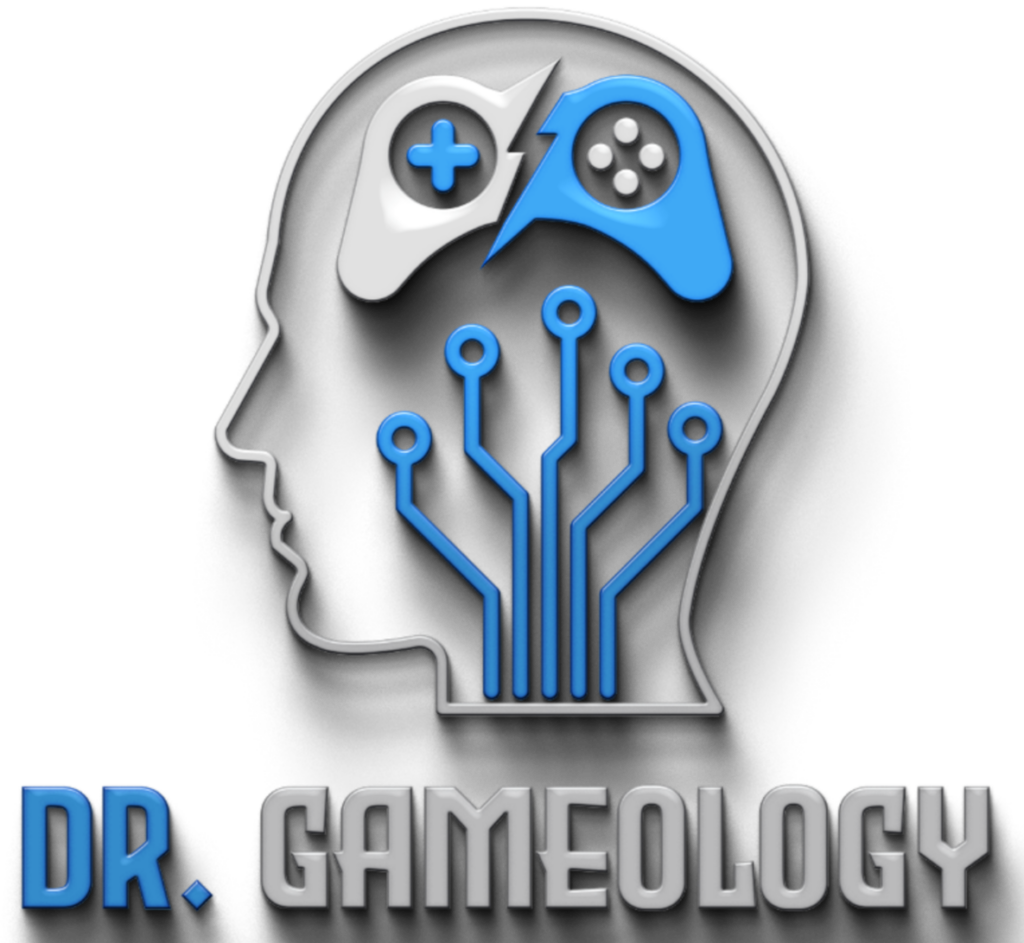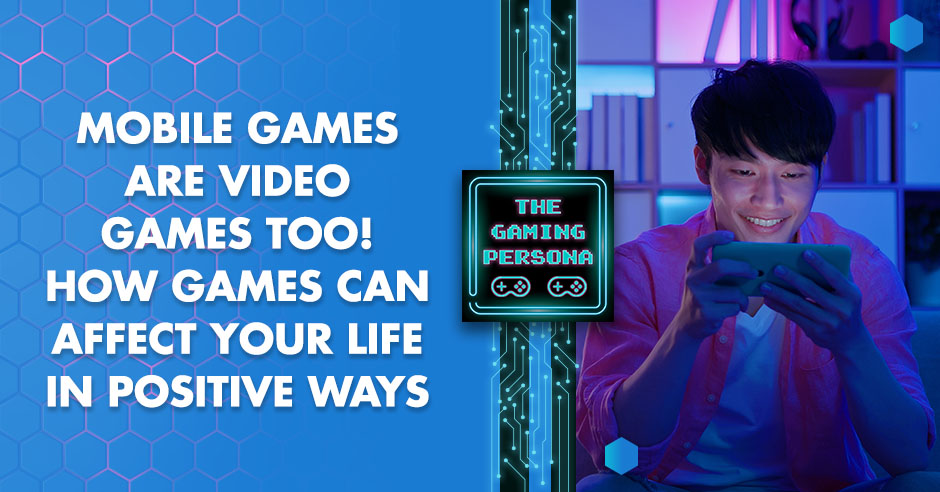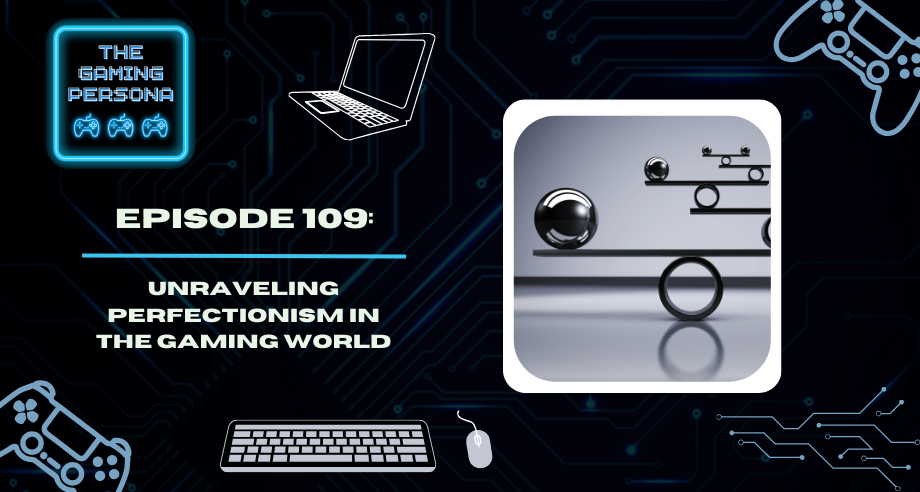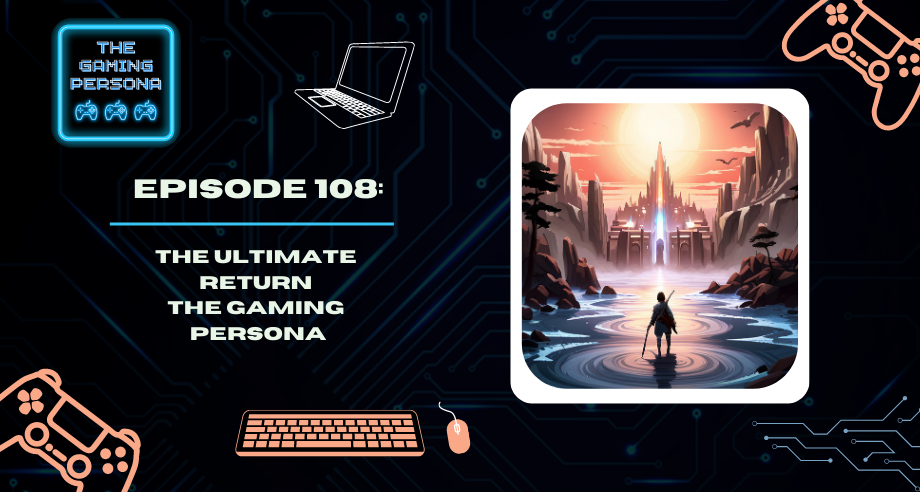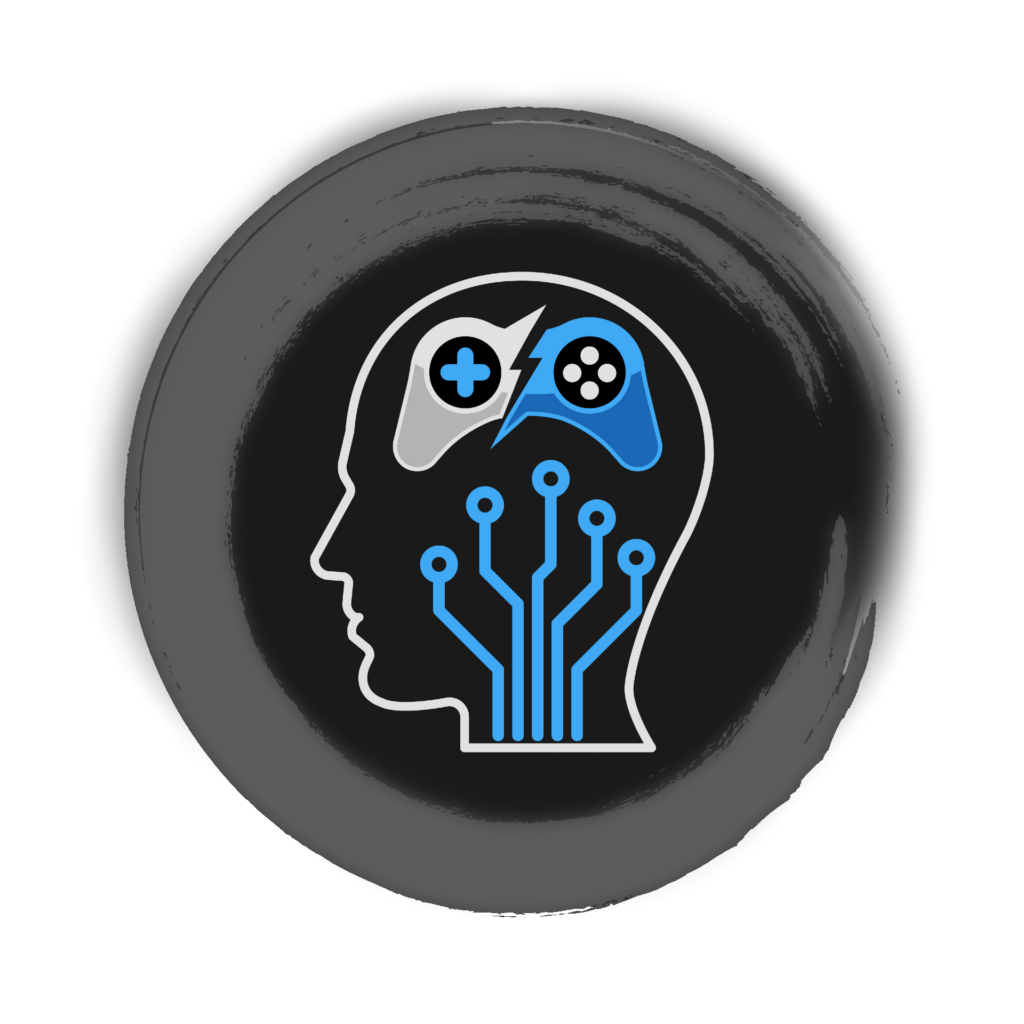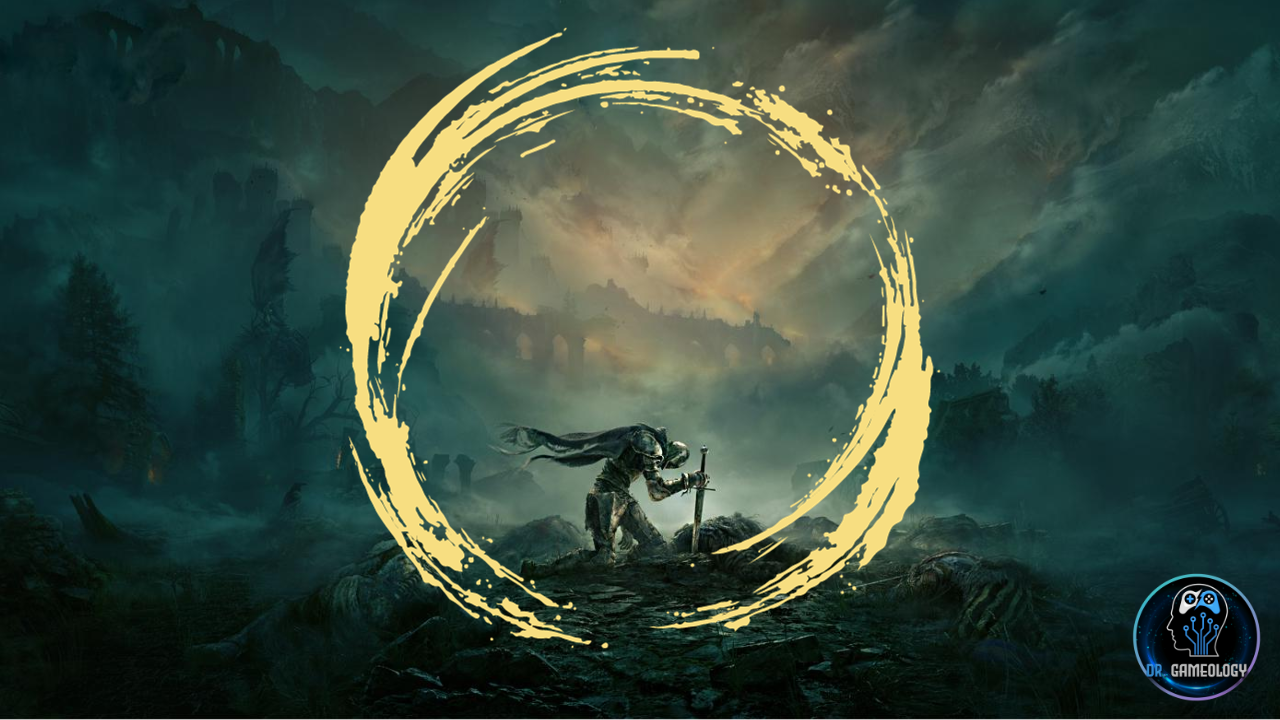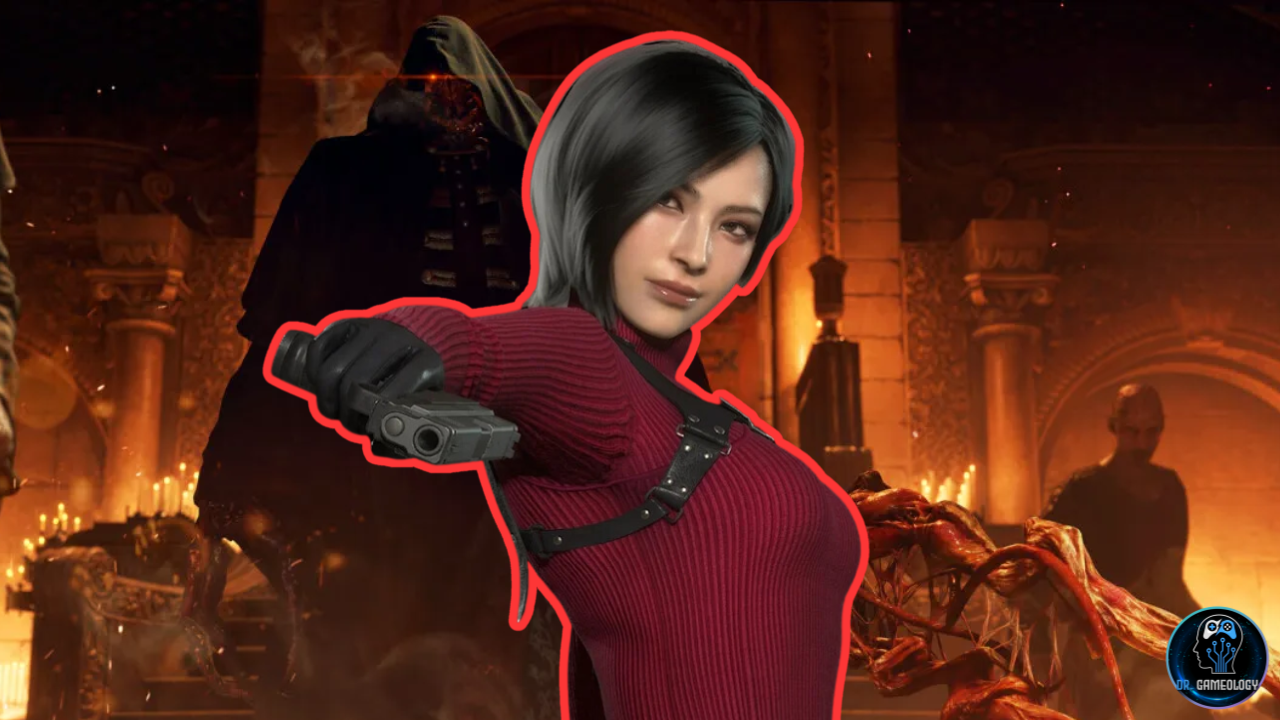Did you know that mobile games can help boost mental health? Dr. Gameology and Jenny review some of the mobile games they are currently playing. They give special mention Pokemon Go, Candy Crush, and other games that had a tremendous impact on mobile gaming. It’s interesting to dive into the psychological insights of the mobile gaming experience. Examples include the experiences of boredom, apathy, anxiety, and satisfying fulfillment in the way we connect with these games. Tune in to learn more!
—
Listen to the podcast here
Mobile Games Are Video Games Too! How Games Can Affect Your Life In Positive Ways
You can find me at DrGameology.com, where I’m posting all kinds of fun stuff about the psychology of playing games. I’m also on Twitch and other social apps, @DrGameology everywhere across the board. The Gaming Persona can be found on Apple Podcast, Spotify, Google, and almost anywhere else podcasts can be found. What are we talking about from the world of video games?
We are going to talk about mobile games.
I’m sorry. There are red numbers on my apps. I got distracted. What are we talking about?
We’re talking about games on our phones that keep us distracted, or at least me.
We’re talking about mobile games and that is a new topic for our show. We may have acknowledged that they exist, but I don’t know if there’s a specific episode where that ended up being the goal. There are 64 episode concepts that are better than this one.
We cannot set that precedent because every other topic and every other guest that we have from here on out will seem less important.
That’s not what I meant. I’m shocked that we found 65 other things to talk about. Let’s go to our Ordinary World where we share everyday life through our games. I need the Ordinary World in order to talk about what I’m about to say. The whole idea of Dr. Gameology started because I did a presentation in Florida. It was my first time returning to the swamp after departing for the desert of Tatooine.
The presentation was on Final Fantasy Brave Exvius. One particular person shared their detailed month-by-month story of gambling addiction, buying the loot boxes with the micro-transaction crystal packs that you can buy in that game. The thing mobile games do in order to generate so much revenue is usually they’re free or cheap to download onto your phone, but the amount that you get to play them is gated behind energy crystals of some kind.
In order to get more crystals when you run out which unlocks playing more play for the next ten minutes, next half hour, or next hour without worrying about it, you have to do some micro-transaction, whether it’s $0.99 cents to $2.99 or even $99.99. As a result, people that are the kind that will swipe their debit card 15 times in one day at Disney, and then come home and realize they spent $2,700, which at Disney is like you bought lunch for 3 people in your family.
You have the tools to contribute truth. Share on X
Mobile games do that. They generate a lot of revenue by using a gamified financial manipulation on the players that are enjoying them. A lot of mobile games are fun and do have some positive values to them as well. That’s probably what we’re going to focus on. I did a presentation on this balance of, “Here’s a Final Fantasy game, and here is a sad story of someone playing a Final Fantasy game.” The cool thing I noticed is I’m the only person in the room that out loud was talking about how cool Cloud Strife is as a character from Final Fantasy. Probably I’m the only person in the room that owns a Buster sword.
I love these characters and I’ve done actual, better research on them since that time. That was the presentation where I realized I have to keep talking. A few years later we started the show. I do look at that presentation on mobile games. This is not a game that is anywhere else. I look at that presentation as important in me starting to figure out how can I be something that I want to be as a mental health professional? Why did you want to talk about mobile games, Jenny?
In my Ordinary World, I did play Munchkin with some friends.
You mean the game that is allegedly named “Jenny Wins?”
Yes. I’ve played Munchkin for many years. I don’t know what it is about that game, but I tend to be good at it. I rarely lose. I was playing with friends one time many years ago and they decided to cross off the name Munchkin on the box and write, “Jenny Wins” on it because that’s all that ever happened whenever we played. I played Munchkin with some friends and we played a different version. There are so many different types of Munchkin games. They do them themed on popular fandoms and different concepts. There’s Munchkin Unicorns, there’s Munchkin Booty which is a pirate theme. There’s a Harry Potter Munchkin.
The one that we played was Star Munchkin, which is space-themed. I did not win at all. In fact, I was the last place. I don’t know what it is about Star Munchkin, but it was not called “Jenny Wins.” That was a lot of fun. We went to this place in town where you pay $5. You can go in and grab a table. There’s a giant wall of board games that you can choose and play for as long as you would like. They have food, drinks, coffee, and stuff. It was cool. It looked like a Panera but with this awesome added section with all these games. We got a lot of fun.
The reason why we’re talking about mobile gaming is because I started playing a new game on my phone. Granted, I don’t like playing games on my phone. I don’t like having notifications on my phone. I turned those off at some point and it’s been great. I don’t usually like playing games on my phone because it’s a little bit too accessible for me. It’s too easy to pick up your phone and play. I don’t typically play them. A few weeks ago or so, I picked up a game called Evony.
I remember this game from years ago on the PC. It was an online, real-time war type of game. You gather resources. You develop your city. You raise your armies and then you fight other people. There’s lots of PVP. The game years ago was simple. The graphics were maybe a tiny step above Oregon Trail. It was so simple. It takes real time to accomplish anything in the game. To level up your archery, gather enough resources, feed your troops, build your walls, or whatever it is, it takes actual hours for this stuff to happen.
Even when you attack a city, depending on how far away it is, it can take you 3 hours to get there and then 50 minutes to see what happens in the battle. You get a report back on what happened. It was a lot of scrolling, reading, and clicking. To me, it seemed so dumb and boring back then. I remember making fun of my boyfriend at the time for playing it. I was like, “This is the dumbest game I’ve ever seen. I don’t understand why you spend hours in front of the computer doing this.”
Let me tell you, I now understand why. The game that I’m playing is a different version of the game. It’s similar. It’s still a real-time war game, but there’s a puzzle component. That’s the reason why I started playing the game. I like puzzles. I played the game. It didn’t click in my mind that it was the old Evony game, similar type war game. I saw an ad for this puzzle game. I was like, “Let me download this, see what it’s about.” It only gives you five puzzles before you have to upgrade things in your city and do all this stuff. There’s a gate. The actual gameplay is gate-kept.
It’s locked behind different walls.
Luckily, there are plenty of things you can pay for in this game. I haven’t spent any money on it, but there are lots of things that you could pay for. I haven’t seen the need to pay for anything. I’m probably playing it wrong because I only care about the puzzles. I do whatever it takes.
Are you enjoying it, Jenny?
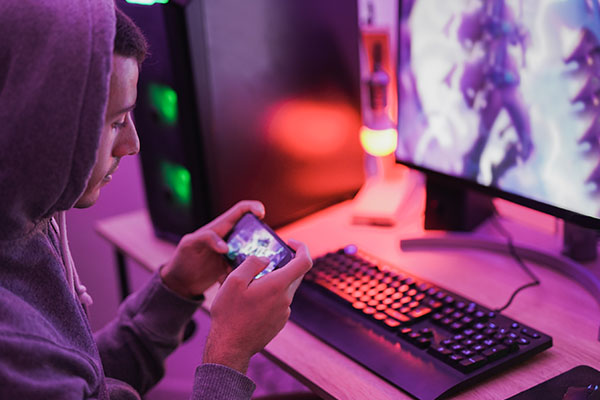
I am. I love the puzzles.
You’re not playing it wrong. Don’t even start that conversation with people. All of this internet stuff about, “Get good,” kind of thing, I hate it. There are challenges that appeal to certain people. In a lot of mobile games, cheating isn’t a thing, unless you’re involved in jail-breaking your phone and things that. If the game lets you do it and you enjoyed it, then that’s correct for you.
I’ve been playing that for weeks. It has taken a lot of my attention. I’m probably going to stop playing soon because I don’t know what end game is in this game. I’ve gotten pretty far and it’s gotten a little bit repetitive. If I were into the PVP aspect and the war aspect of the game, I would enjoy it more but the puzzles are pretty easy so I don’t reach flow anymore.
It got too easy for you.
Yes. That was my week in the world of gaming.
That sounds awesome. I’m going to shift away from the mobile games quick because I haven’t been playing many of those in a few weeks, but Jenny, we accomplished something cool.
There you go.
We are presenting at MegaCon and we’re doing a panel on the Psychology of playing Final Fantasy XIV. That is so crazy. The Four Hobbits are going to be at MegaCon. A whole slew of WWE wrestlers got announced as being at MegaCon. We’re not doing autographs. If someone wants me to sign something, I will. It’s so cool that down the hallway, take a left, go into a room with a bunch of chairs and there’s going to be the two of us and the rest of our crew that we’ve banded together to create a panel group that can do things in this region, Florida, Southeast United States.
I’m sure if we kept going, some of them would be willing to travel for things like this, but MegaCon is right here. I’ve been to that event so many times as a fan. In terms of the hero’s journey, we have usually the nuclear formula of the hero’s journey. It is where you take the 12 or 13 phases of the hero’s journey, depending on how you count them. You boil it down to three phases. Those three phases are the separation from the Ordinary World. You have the initiation where you acquire the power to do the great thing, and then you have the return and us getting to be at the table in the podium for that is huge return energy.
It’s so crazy that we’re going to be at the same event as John Carlos.
The Undertaker?
The hobbits, what? This is crazy. I’m so excited about this. When you told me that you were applying for it, I was like, “It would be cool.” I honestly wasn’t expecting much. I was like, “I’m sure they get so many submissions.” For those, MegaCon is a big con in Florida.
It’s one of the biggest cons. It is in the top 10, as far as revenue generation, attendance, and things like that. We could accidentally keep going and end up at San Diego Comic-Con or something.
You have to want to move forward. Share on X
Yes or New York Comic-Con.
Let’s enjoy this one though. It has started me thinking about the things I’ve done so far. I’m so excited every time we publish a new episode, every time we come up with a new topic, every time I get the idea of, “I could research that.” I have the tools to contribute truth to a field that often doesn’t know what it’s talking about, not in a bad way. Psychology wasn’t exactly designed to understand creative processes for joy. It’s become this thing that is thirsty to label things as despair. I like bringing that message to people. Speaking of despair, I’ve been playing a lot of Elden Ring.
I switched to playing Elden Ring on the PC because I recognize that I don’t want to play in my living room and be a sad, defeated mess in front of my family. It’s similar to grading papers when you don’t feel like it, that feeling of your soul getting crushed repeatedly in the game, asking you, “What are you going to do next?” You might have 200,000 ruins stored up.
You’re like, “I’m going to level up once I get back to that camp,” and then you die. The ruins float away and you never get back to them. It’s so devastating. I love the game a lot. I made it farther on the PC than I was on the PS5 so that’s a big accomplishment. I did it quicker, too. I’m happy about that. I made it to the next map section. I’m at Liurna of the Lakes. I’ve killed about 30 bosses, 2 that are main bosses that advance the story. I’ve been finding all the different caves and trying to collect new weapons.
I got this cool magic spell that brings up three rocks out of the ground with purple energy on them. It does a lot more damage than the spells I’ve been working with, so that’s cool. I like fantasy and magic. It’s been a lot of fun to get into that. There are a couple of other things I would like to talk about. It’s important that we go to the college to adventure. There are a couple of other games I’ve been playing or thinking about playing. I would like to say as a thing that I might purchase soon, there is a sale on Fatal Frame, Jenny. You being a photographer, do you know what Fatal Frame is?
All I know is the 30 seconds that I watched of the trailer that you linked in our notes.
It’s a scary horror spooky game in that you have to avoid death from the ghosts by taking pictures of them successfully. This is your in vivo desensitization if you ever needed to overcome your fear of games that are not named. What is that game that we played once?
Phasmophobia.
I don’t understand how that game ended up being the unicorn of safety for you.
I don’t know.
I won’t belabor the point. We need to go on our Call to Adventure and get into our topic for the week. Jenny, we’ve talked about some mobile games from both of our perspectives, so let’s get into it. What are some of the most important mobile games that you have played in your gaming journey?
I’ve played a few mobile games. I played Candy Crush back in the day when it first came out. That game is so addicting for me. In the game, you have to flip candies and then create a line of similar candies. They either explode, do something fun, or whatever it is. Anywhere that I saw a grid in real life, if it was checkerboard or something similar in style to the Candy Crush checkerboard look, even if it had nothing to do with Candy Crush, I was in my mind flipping the squares, trying to get them in line. Once I started doing that, I was like, “That’s it.” I immediately deleted the game. I was like, “This is terrible.”
Jenny, you made me think of the YouTube videos that are called Candy Crush is Evil by Glove and Boots. Are you familiar?
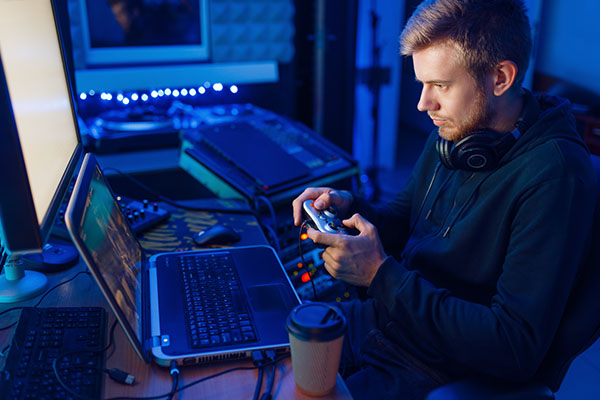
I never heard of this.
You’ve never heard of this?
No.
We’re going to have to pause and you’re going to have to watch this and then we need to talk about it. Let’s do that. We’ll put in a sound effect and we need to talk about this.
Okay.
You watched Candy Crush is evil on YouTube by Glove and Boots. What do you think, Jenny?
That was hilarious and extremely relatable. The progression that they described was so true. When he said, “Every time I close my eyes, all I see is candy.” That’s exactly what happened to me. That’s why I stopped playing the game.
The one thing that I’ve experienced that is similar to that is when Rock Band came out. I was driven to clear every song on drums on expert. I would play some of them over and over to try to get through the stanza where I would crash and burn. I did accomplish that goal on Rock Band 1. Anytime things were moving in a lane like driving, I would start to see the lines of the road as if they’re the tracks on Rock Band. There would be something about them. I never hallucinated Rock Band notes on the road or anything like that but there’s this expectation that I’m looking at Rock Band when I’m not.
I was watching a comedy special and the background, like the set on the stage was a checkerboard and I was so distracted by it. I wasn’t seeing candies, but I was so distracted because it reminded me of the checkerboard on Candy Crush. I was like, “This has got to stop.”
I have shown that video at mental health conferences and used it as a slide. There’s another cool segue. You and I have both played this game, but this game clicked with me and led to all kinds of professional discussions as well. There is a game called Duet. If you need to look it up, you would probably type into the search on your phone, “Duet Game.”
It’s a simple game about controlling a circle with a blue dot and a red dot while white blocks fall from the top of the screen. You have to spin the dots around them so that they do not burst. They’re like balls of paint. When you crash into a white block, the paint pops like a paintball. The next time that exact block that ended you falls when you try again, it is splattered with the evidence that you failed there.
This game is a perfect example of video games achieving psychological flow. The levels build. There is a calming voice with a nice meditative style music track. The progression of the voice, depending on what difficulty you’re playing on, is either coaching you through self-esteem, grief, and loss, or a depression state into confidence. There is a mode where you can do all the levels in a row with no interruption.
The more successful you are, the faster the speed of the game becomes, going up to 200% speed. My favorite part in the message of that game is, “I don’t want you to move forward. I want you to want to move forward.” That’s so important when I’m trying to accomplish therapeutic things with people, but the message is also in this package of psychological flow in video game form.
Research shows that Pokémon GO helps overcome loneliness. Share on X
In actuality, this presentation where I show Candy Crush is Evil, I then follow up with a couple of slides later a video of success and failure in this game of screen grabs of me playing it to talk about what is it inside mobile games that causes people to want to play. We talk about psychological flow and how it’s not just addiction. Addiction is evil and games are evil. It’s that games offer an experience that you don’t find in the regular activities of day-to-day life. If I go to the grocery store, fill up my cart to get food for the week, there’s nothing about that that has this flow experience like in Duet game or what some people get in Candy Crush.
These games can do good and bad things for people. Our Ordinary World is talking about what the difference is. There is no situation where the Duet game asks you to charge $20 on your debit card to do anything whereas Candy Crush wants your money. It’s a business that is pretending to be a game on your phone. It is a game. I don’t mean that people who play Candy Crush are not actual video game players, but you clearly see capitalism existing in the design of Candy Crush and games like that.
It is also accessible. Mobile games are the epitome of accessibility. I honestly don’t know why this is, but people that don’t typically play video games will play phone games.
Jenny, you sent us on the Road of Trials where we face our challenges and discover our strengths. What did you say?
People that don’t normally play video games will play mobile games. I’ve never seen my sister play a video game in my entire life. We were talking one weekend. We had a long drive. We went on a little road trip. She was playing a game on her phone and telling me about the game. She’s like, “I’ve been stuck on this level for a week. I can’t get beyond it. I spent $5 on I don’t know what and I still can’t get beyond it.”
We were talking about how she’s only ever spent $5 on it. Sometimes it’s an issue. My sister is a person who does not play video games in day-to-day life but has picked up a game on her phone. The game that she was playing is a matching tile-type puzzle game, similar to Mahjong. The draw for her is you can do some interior decorating. By beating levels, you get different upgrades and things like that to decorate. I don’t know if it’s a room or house or something.
It’s like Strongholds in Star Wars Field Republic or the Housing Market in Final Fantasy XIV.
She’s got a high design motivation, it seems.
That is customization motivation. You’re not putting the decorations on a humanoid avatar. It’s a dwelling.
I’ve played some games where the main part of the game, the puzzle, or whatever isn’t what I care about. It’s more so what I get to do with the rewards.
I want to talk some numbers quick. I’m not a gamer. I spend money on games that are on my phone. When we think, “Who are the video gamers?” we’re probably thinking console gamers. There’s a machine in their bedroom or living room that’s manufactured by Microsoft, Nintendo, or Sony. People who play games that way in 2021 were responsible for an industry that earned $50.4 billion, all games, all sales, all added together. Esports revenue probably is somehow packaged in there and any transaction that’s due to a game being played on a console. $50.4 billion moved around.
PC gamers are the other brand. That’s $36.7 billion. I’m not a mathematician here, but we’re talking $87 billion. It’s the same thing for mobile games. Any transaction because of mobile games, micro-transaction, download transaction, anything amounts to $93.2 billion. During 2021, which is a big year for us figuring out what we’re going to do about COVID 19, consoles and PCs both decreased year over year in those revenue figures. Mobile games went up 7.3%.
All of this data is coming from New Zoo’s 2021 Global Games Market Report. Anyone who thinks they are not a game player, but has a game on their phone that they turn on when they’re waiting for their food order to be called or checks their notifications during their coffee break at work. They work hard. It’s nice to relax for seven minutes. You’re a game player. It may not be something that you talk to people about conversationally. You may not even realize it, but the industry appreciates you because $93 billion is a lot of money, Jenny. In fact, I’m still in a place where $93 is a lot of money.

It’s not surprising to me only because we’ve had conversations and looked at some of this data before. Upon learning this for the first time, I would’ve never guessed. It makes sense, especially the fact that both console and PC gaming has decreased or the revenue has decreased because of supply issues. It’s still impossible to get your hands on some of these consoles.
I still owe a huge debt in my life to your brother for helping me track down a PS5. In hindsight, that was a nice thing for him to do. I don’t think I would’ve gone out into the wilderness and found a wild PS5. That leads us to our next mobile game that we’re going to talk about, which is Pokémon GO. As everyone knows, Psychology of Pokémon is coming out as a book. You can buy it later in 2022. The target is July. I’ve gotten to see the pre-print of my chapter, so it exists. One of the cool things that did factor into my chapter is some studies that look at the science behind playing Pokémon GO. I wanted to share a few things. When’s the last time you played Pokémon GO, Jenny?
I played it summer of 2021 because I was babysitting my friend’s child and he loves the game. We went for a walk and adventure and looked for all these Pokémon that I have no clue what they are.
As soon as they expand past generation one, I get a little hazy. When they get to generation three, I’m like, “This is not my world anymore.” Jenny, one of the things for me that helped me to separate from the game and play it less is I have the first 151 Pokémon complete.
Oh, you do?
From Bulbasaur to Mew.
That’s impressive.
Once I did that, I felt I have all of my Pokémon.
I feel the same.
Going into the psychology of playing the game, there are all kinds of fascinating things that we could talk about. It would change the topic of the episode, too. One of the things that I want everyone to know has been done, and maybe in the future we will talk about more, is motivation for playing specifically Pokémon GO, is a thing that’s been researched and the connection that those motives have with life benefits.
For example, social bonds with others, conversational connections with others, overcoming loneliness, life satisfaction scale scores, which we’ve had a whole episode about, and physical health. They all have been measured and compared to age, gender, and play time, but also to the motivations for playing online mobile games. A lot of the big time motivations, a lot of the personality structures like the five-factor inventory, we have data about what motivates people to play Pokémon GO.
It turns out that it is conscientiousness and neuroticism. This comes from a study on Deconstructing Pokémon GO – An Empirical Study On Player Personality Characteristics. This was carried out by Mattheiss, Hochleitner, Busch, Orji and Tscheligi in 2017. They did a five-factor inventory analysis of what happens that motivates people to play Pokémon GO. It’s so interesting that that’s always the answer. Do you have a favorite Pokémon that you have caught in Pokémon GO, Jenny?
I’m going to tell a story about the time I caught a Venusaur.
Pokémon GO is invigorating for people coming to therapy. Share on X
You caught a Venusaur?
When the game was at its height, my friends and I would get drunk, walk around, and play Pokémon GO, and it was so much fun.
Disclaimer, The Gaming Person show does not recommend getting drunk and playing mobile games out in the wild. Pokémon responsibly.
I caught a Venusaur. I was so excited because all anyone was catching was Pidgeys and Rattatas. They were all over the place and I found a Venusaur. I caught it. I was so excited that I posted on social media and I was like, “I caught a Venusaur.” My friend commented on my post. It was like, “That’s an Ivysaur.” I was so wrong and so drunk.
You fake gamer, Jenny.
I know.
I’m so mad at your friend. That’s so mean.
It was funny. It was all in good fun.
Pokémon battle for your honor, Jenny.
That’s the time I thought I caught a Venusaur.
For me, my favorite is Charizard. Charizard is my favorite Pokémon going back to my time playing Pokémon Red Version in middle school, that little kid I used to be. I love Charizard so much that I have four Charizards in Pokémon GO. What keeps happening is I got my first one and I leveled it up all the way, because I wanted a Charizard. I got another Charmander that had better abilities. I was like, “I’ll level this one up so that battle-wise, I have a better Charizard.” I caught a shiny Charmander. I was like, “I need to have a shiny Charizard.” Now I have three Charizards. I am the father of dragons.
My favorite Pokémon is Articuno. I don’t think I ever got one though.
Before COVID 19, they had a period of time where those dailies that you would complete to get a stamp. Every time you filled up the stamp card, it was guaranteed that a legendary bird would be catchable. You didn’t know if it was going to be Moltres, Articuno, or Zapdose but they ran it for a couple of months. If you did it every week, you would get eight tries. That’s how I got my legendary birds. They don’t do cool things like that anymore.

I also love Mewtwo because Psychic shares some letters with Psychology. I always am drawn to Psychic Pokémon. Also because of that, one of the starters from the Kalos Region is a fire Pokémon that has secondary for psychic. That one is named Delphox when it fully evolves. It’s Fennekin as a starter. I like that one, too. That’s me as a Pokémon GO player. When that game came out, it was invigorating for people coming to therapy. They would be completely different people. They were getting out of the house. They were getting tons of steps every week.
They were talking about achievements instead of sounding depressed and giving me a story of worthlessness. They were talking about accomplishments and goals in a video game. It’s also goals in a Pokémon game and that’s arguably cooler than a lot of goals that happen in real life anyway. I liked the energy of those sessions and then working to repackage the focus into, “This game is proving that you’re able to do a lot of interesting things.”
If you have that conversation for months straight, you could start college in the fall. You could reach out to a friend that you’re sad that you drifted apart. You could call your parents that you’re estranged from and try to mend bridges. It’s strange to think Pokémon GO represents all that opportunity, but it represents it a lot better. It’s a better approximation of being able to do those things than what happens when you’re depressed and you’re stuck.
I believe we should go to the Ascent and elevate the topic. We’re moving out of Pokémon GO and away from Candy Crush. We’re going to talk about the importance of challenging ourselves again, psychological flow. We have a study from the 2020 Journal of Behavioral Addictions that looked at skill challenge balance in complex mobile games and the game they manipulated to see how well people would experience flow and stay graceful in their challenges was. What game do you remember?
No.
Candy Crush.
Sorry. I missed that.
It’s fine. I would to turn it over to you, Jenny, as the person who is going to guide us into our discussion of flow. There are a series of mannequins that this study used. Think about these flashcards. There are five flashcards. I want to give you the honor of explaining to our audience what the little mannequin on these flashcards looks like.
On the left, the mannequin signifies arousal from low arousal, and then it increases in arousal up to high arousal on the right. There are five of them. The first one looks square and rectangular. He does have a little face. He’s got some hair, headphones, or helmet. I don’t know. He’s got little feet. His arms are pretty short. The first one has a little dot in the center of his chest. As you go up in intensity from low arousal to high arousal, the second little mannequin got a little bit more going on in his chest. It’s like a little amoeba-looking shape.
It’s like his heart. It’s showing you the activity in his chest.
His heart has grown a little bit more pronounced from the little dot. The third one, the heart is growing. The amoeba has taken shape. It looks like an egg. I’m not going to lie. It looks like a fried egg but it’s bigger. It’s taken up a little bit more space on the chest area. This is the medium level of arousal. After that, it gets crazy. The egg grows to the entire width of the body. There are little lines on the outside of it, indicating shaking. The final one looks like an explosion. You could still see his face. He looks unbothered honestly but it’s an explosion. There are shaking marks all over the body, not just on the chest.
His eyebrows have raised in that one, too. It’s terrible.
I didn’t notice. His eyebrows are raised, so he’s not unbothered. He’s worried about the explosion on his chest.
The only way to experience flow is to expose yourself to a challenge that you may not complete successfully. Share on X
This is a five-point Likert scale but in flashcard form. They’re calling what it’s showing arousal. The level one is just a dot in the center of the chest. There’s no activity. There’s no tension. That is boredom using flow terminology. As you move up, the fluctuations in the chest get more pronounced and creative, even to the point with the explosion mark. That is anxiety, frustration, and anger.
If you’re experiencing the feelings of challenge and the impact of your skill like we do when we’re talking about psychological flow, you’re not at that one where it’s bored. You’re not at the five where your heart’s exploding. Depending on the player, you might be in the 2 or 3 range. You need to be pressured in order to feel flow, but you need to handle the pressure purely with your skill and the activity itself in the driver’s seat of your action.
With Candy Crush, you have all these little candies moving around. The experimenters here were manipulating it so that only the players that are experiencing flow during difficult levels continue in the study. If you’re too good at the game, you’re bored. You can’t participate because this is not what flow looks like. If you’re too bad at the game, meaning you’re losing levels that you should be able to beat, shame on you. You’re also removed from the study. You need a certain percentage of success at a reasonable level of difficulty for what’s being measured. They would have you rate the experience on these flashcards.
The different terms that the person would be asking questions about would be boredom, apathy, anxiety, and flow. That is the quadrant model of flow. I’m talking about flow all the time when I’m doing DPS measurements in Final Fantasy XIV, or I’m spinning little dots in my Duet game on my phone, and I’m not breaking them for minutes at a time. That’s because I’m recognizing patterns.
I’m pushing the buttons in the right way. I’m meeting the challenge. I’m not bored, but I’m not worried. I’m just in it. You have played Candy Crush more than me. I have only played it once. I can’t speak to the experimentation of this study. Out of those flashcards, Jenny, if you had to pick two that you were at most of the time with Candy Crush, which flashcards do you think you were as a player for that game?
I’m going to say 3 and 4. For those more difficult levels, it was frustrating and probably anxiety-inducing that I couldn’t beat them and I was stuck on them. For the most part, the challenge met my skill level.
It’s cool that we’re talking about this. In my core philosophy for what makes me want to do the things I do in my day, I do believe that the only way to experience flow is to expose yourself to a challenge that you may not complete successfully. That stops people in their tracks though when the worry about your future, your reputation, and how you’re perceived by others motivates your actions. You need to have a little bit of IDGAF. That’s a psychological term. You need to have the IDGAF factor at a certain point so that you can do things that may not be prosperous quickly.
Your conscientiousness scores need to be a little lower.
You have to be willing to have flow or die trying. I don’t like the YOLO aspect of that. A lot of times, it’s so easy to get stuck in the normal flow of life. You haven’t been challenged in a long time. You start to dislike the feeling of challenge. As a result of avoiding challenge and failure completely as a possibility, you also are avoiding flow. This may be something that is not a topic for now. If you’re avoiding flow, I feel like you’re avoiding destiny. Let’s go on the Return. Find our destiny. Take that into our next step forward. Jenny, I want to hear what you were about to say before I transitioned us.
You have to do the hard things. That’s the only way. Being afraid of failure is a huge barrier sometimes. Because something is hard or difficult or challenging doesn’t mean your skill level won’t eventually rise to that level.
We’re in a hurry to be proficient. Sometimes you have to ask whether it’s someone else asking, or it’s you asking yourself, “What’s wrong with being bad at this?”
Sometimes it’s good for you to be bad at something because it gives you something to work towards. When you are finally good at it, then it was worth it. You get that little fear a moment. You feel accomplished. While the world was playing Pokémon GO, the fact that you saw a change in your therapy sessions because of this game, that is so poignant to me. That’s so cool.
2016 will always be a year that I remember fondly as a counselor because of Pokémon GO. It’s unfortunate that the zeitgeist of game energy shifts to other things so rapidly. Now it’s much harder to find people that wake up in the morning and their goal is to master Pokémon GO in some way. I’ll always remember that in a happy way. We’ve talked about so many different things, Jenny.

I hope that when people think about mobile games, they come to understand that they are video games. The great thing about them is they are mobile. They can fit into so many different spots in your life without you having to change much about who you want to be. You got to make sure that they are still not changing things about who you want to be. They can teach us lessons about planning our activities. They can teach us about flow. They can give us opportunities to connect with other people in good ways and incredibly annoying ones, too.
“I don’t want all my friends to know I play this stupid game,” like in the Glove and Boots Youtube video. Any video game is an opportunity to understand yourself, the good things that you hope you can unlock, and the unfortunate things that you hope do not define your existence. My final quest for everyone is to take these lessons with you on the go everywhere and continue the journey.
See you next time.
Important Links
- DrGameology.com
- Twitch – Dr. Gameology
- The Gaming Persona
- Apple Podcast – The Gaming Persona
- Spotify – The Gaming Persona
- @J.LeBronPhotography – Instagram
- JLeBronPhotography.com
- Candy Crush is Evil – YouTube
- Psychology of Pokémon
- life satisfaction scale scores – past episode
- Deconstructing Pokémon GO – An Empirical Study On Player Personality Characteristics
